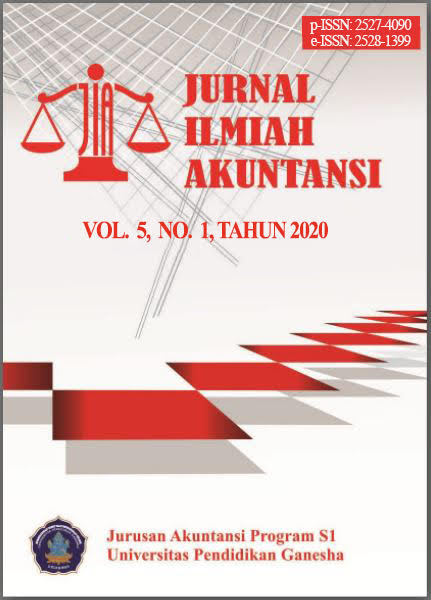Internal Locus of Control dan Efek Computer Anxiety pada Kinerja Karyawan Keuangan
DOI:
https://doi.org/10.23887/jia.v5i1.22668Abstract
This study aims to analyze the influence of computer anxiety on financial employee performance and to analyze whether the internal locus of control moderate the influence of computer anxiety on financial employee performance. This research is expected to be able to give consideration to Lembaga Perkreditan Desa (LPD) to routinely provide training in both computer training and personality training to their employees so that their employees are capable of operating financial computer programs that are used and have good personalities and are able to provide maximum services to the public. The data used are primary data in the form of answers to questionnaires distributed to LPD employees in the Kota Denpasar. The analysis technique used to answer the research hypothesis is Moderated Regression Analysis (MRA). Hypothesis testing results show that computer anxiety has a negative effect on financial employee performance, and internal locus of control weakens the influence of computer anxiety on financial employee performance.
References
Ali, S., & Fadila. (2008). Kecemasan Berkomputer (Computer Anxiety) dan Karakteristik Tipe Kepribadian pada Mahasiswa Akuntansi. Simposium Nasional Akuntansi (SNA) Ke‐11, 1–35.
Ghozali, I. (2012). Aplikasi Analisis Multivariate dengan Program IBM SPSS 20 (6th ed.). Semarang: Badan Penerbit Universitas Diponegoro.
Harimurti, F., & Astuti, D. S. P. (2016). Pengaruh Computer Anxiety terhadap Keahlian Pemakai Komputer dengan Internal Locus 0f Control sebagai Variabel Moderasi. Jurnal Ilmiah Akuntansi Dan Bisnis, 11(2), 91–99. https://doi.org/10.24843/jiab.2016.v11.i02.p04
Juniariani, N. M. R., Pradnyanitasari, P. D., & Priliandani, N. M. I. (2018). Kinerja Individual Karyawan Ditinjau dari Konsep Theory of Planned Behavior (Studi Kasus pada Dinas Perpustakaan dan Kearsipan Kota Denpasar). Behavioral Accounting Journal, 1(1), 25–36. https://doi.org/10.33005/baj.v1i1.16
Lindawati, H., & Salamah, I. (2011). Pemanfaatan Sistem Informasi dan Teknologi Informasi Pengaruhnya terhadap Kinerja Individual Karyawan. Jurnal Akuntansi Dan Keuangan, 14(1), 56–68. https://doi.org/10.9744/jak.14.1.56-68
Naviera, W. (2015). Pengaruh Computer Self-Efficacy, Computer Anxiety dan Attitude pada System Use dan Dampaknya terhadap User Satisfaction dan Individual Impact (Studi pada Mahasiswa Program Sarjana Angkatan 2011-2013 sebagai Pengguna Sistem Informasi Akademik Mahasiswa (SI. Profit: Jurnal Administrasi Dan Bisnis, 9(2), 1–11. https://doi.org/10.21776/ub.profit.2017.011.01.2
Parasara, A. A. P. (2014). Pengaruh Computer Anxiety Pada Computer Self Efficacy. E-Jurnal Universitas Udayana, 7(2), 289–298.
Patria, I. K. R. (2019). Pemkot Menargetkan Seluruh LPD se-Kota Denpasar Memiliki Server Tahun 2022. Retrieved March 3, 2020, from https://www.news.beritabali.com/read/2019/01/30/201901300017/pemkot-menargetkan-seluruh-lpd-se-kota-denpasar-memiliki-server-tahun-2022/
Sanjiwani, D. P., & Wisadha, I. G. S. (2016). Pengaruh Locus of Control, Gaya Kepemimpinan dan Komitmen Organisasi pada Kinerja Auditor Kantor Akuntan Publik. E-Jurnal Akuntansi, 14(2), 920–947.
Saputra, K. A. K. (2012). Pengaruh Locus of Control terhadap Kinerja Internal Auditor dengan Kultur Lokal Tri Hita Karana sebagai Variabel Pemoderasi. Jurnal Akuntansi Multiparadigma, 3(1), 86–100.
Saputra, K. A. K., & Kurniawan, P. S. (2017). Konsep Good Corporate Governance dan Fungsi Badan Pengawas Sebagai Internal Auditor LPD di Bali. Simposium Nasional Akuntansi XX.
Saputra, K. A. K., Sujana, E., & Tama, G. M. (2018). Perspektif Budaya Lokal Tri Hita Karana dalam Pencegahan Kecurangan pada Pengelolaan Dana Desa. Jurnal Akuntansi Publik, 1(1), 28–41. https://doi.org/10.32554/jap.v1.i1.p28-41
Sayekti, F., & Putarta, P. (2016). Penerapan Technology Acceptance Model (TAM) dalam Pengujian Model Penerimaan Sistem Informasi Keuangan Daerah. Jurnal Manajemen Teori Dan Terapan, 9(3), 196–209. https://doi.org/10.20473/jmtt.v9i3.3075
Wahyudi, W., & Widianto, T. (2019). Pengaruh Computer Anxiety dan Computer Attitude terhadap Keahlian Pengguna Komputer. AKTIVA: Jurnal Akuntansi Dan Investasi, 4(2), 165–176.
Yudha, C. K., & Ramantha, I. W. (2014). Pengaruh Computer Anxiety dan Computer Attitude pada Keahlian Pengguna dalam Menggunakan Komputer. E-Jurnal Akuntansi, 9(3), 644–657.



1.png)


